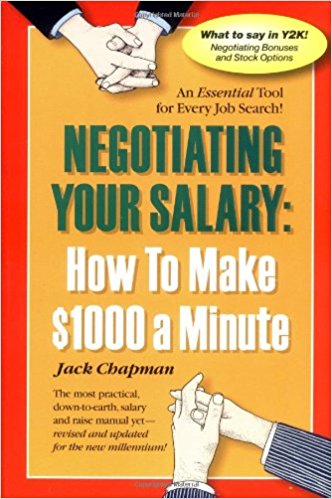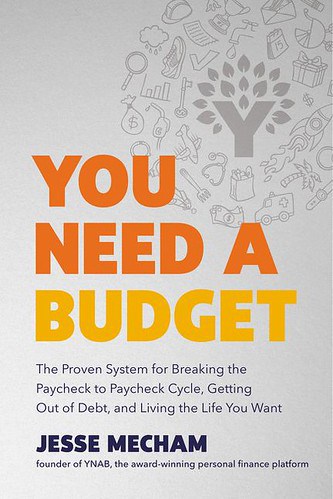How To Negotiate A Salary Increase (And Earn Half A Million Dollars More In Your Lifetime).

Others claim that money will come if you follow your passion. Some people say that you are not supposed to enjoy your job. Truth lies between these extremes. There are few things more miserable than having a job that you hate. Many people have fulfilling, fun careers and earn a decent living.
Any job will be more enjoyable if it pays well. A high salary means you can pursue your dreams and goals with more money. You can increase your income by negotiating a higher salary when you start a new job.
Negotiating Your Salary

Salary negotiations can be uncomfortable or even scary for many people. In his book, he explains how to negotiate salary. How to Negotiate Your Salary and Make $1000 per Minute Career coach Jack Chapman says that the few minutes you spend asking for more money during an interview could add up to tens or even hundreds of thousands of dollars in your lifetime. Perhaps even hundreds of thousands. He claims you can earn up to $1,000 per minute by doing this.
Research backs him up. According to a study by George Mason University in 2010 and Temple University, if you don’t negotiate an initial job offer, you could lose out on more than $600,000. over the course of a typical career.
Chapman writes, “We spend many years thinking of what we will be when we are grown up.” When it comes to a pay raise, we tend to accept what’s offered. How long do we spend negotiating money? Zero.”
Don’t be among them. Your employer won’t give you more money if you don’t request it.
Let’s first review the basic principles of negotiation.
You can negotiate anything
Herb Cohen, in his book Can you Negotiate anything?, writes that every negotiation has three key variables:
- Power is the ability to do things. You gain more power in salary negotiations if you are perceived as having expertise or legitimacy. You have more power if you are better qualified for the position. Power can also be gained through perseverance, attitude and calculated risk-taking. If you are willing to walk away, you have the power. Otherwise, you will be charged by the company.
- Time. The side that has the most time in negotiations usually wins. Keep your cool and maintain an air of calm, no matter how much you are under pressure. You can buy time by having other options. If you have an existing job (or offer of a job) and do not need to accept the other person’s, then you are in a stronger bargaining position. You can be easily manipulated by the other party if you think you must have it.
- Information completes the puzzle. Your position will be stronger the more you learn. Research before you negotiate. Act on any new information that comes up during negotiations. Interviewer’s responses, questions and attitude can all provide valuable information.
Let’s now look at two very similar methods of negotiating your salary.
Note : Keep in mind that these techniques can be used for discussion during a review of performance. These ideas can be used to negotiate a salary increase, and not only for a job change.
Negotiating Your Salary
Jack Chapman outlines five rules to help you get what you want in Getting Your Salary.
First, delay salary negotiations until you have been offered a position (or completed a performance evaluation). Chapman says that the hiring process (or evaluation) is divided into two phases, namely budgeting and judging. When the employer judges instead of budgets, you can only harm yourself when it comes to salary.
second, let the other party make the first offer. Chapman says that it is difficult to be the first person to offer a salary. It can be uncomfortable for many people to avoid direct questions regarding salary expectations. Chapman suggests preparing yourself for such a situation. His website contains a video that explains how to respond to the question “What do you earn?”
Repeat the highest value of the offer and then remain silent. The most likely result is an increase, according to Chapman. This gives you time to consider the offer while still putting pressure on your employer.
should then counter the offer with a well-researched response . Next, you will make a counter offer based on your knowledge of yourself, the market and the company. You should have an idea of the minimum salary you are willing to pay before going into an interview. Use tools such as LinkedIn, Salary.com CareerBliss.com PayScale.com and GlassDoor.com to do thorough research. Ask your friends and co-workers for their confidential feedback about what you should be paid. You will be empowered with this information.
Final is to seal the deal, then negotiate more. Negotiating salary is a two-step process. First, you lock in your offer and then you negotiate any additional benefits. It’s like locking in the cost of the car before you start negotiating its value.
Noel Smith and Wenkle Salary Negotiation Method
Chapman’s not the only person who uses these techniques. According to my research, all successful headhunters and coaching firms use the same process for negotiating salaries.
Noel SmithWenkle, for example, was a headhunter in the 1980s. He used the following technique to maximize his client’s earnings during salary negotiations.
Smith-Wenkle’s first rule is: Never tell your employer how much money you will take. Let the employer name the first number. Chapman offers the same advice. Almost every other negotiation coach gives the same advice.
The Smith-Wenkle Salary Negotiation Method consists of four carefully prepared responses.
- Leave it blank if the company requests a salary estimate on your application.
- Smith-Wenkle estimates that this approach will work in about 40% of cases when the company asks you how much money you are interested in.
- When the company asks again, you should say: “I’ll consider any reasonable offer.” Smith-Wenkle claims that this tactic will work 30% more of the time.
- You’ll need to reply again about 30% of the time. Smart hiring managers understand that they should not be the first ones to make an offer. You can also politely refuse to answer: “You are in a better position than I am to know what I’m worth.” This will be your last answer, regardless of how many times you’re asked by the company.
This method has one purpose: to make the company the first to announce a number. You have two choices once the company has made an offer. Accept the job if the offer exceeds your minimum. Tell them that it is below your minimum but do not specify by how much.
Get more information on salary negotiation
In the last decade, I have talked to many people about their successful salary negotiations. They all stressed the importance of preparation and practice.
Keep in mind that is the goal of an interview (or a performance review), which is to sell you. If you don’t think you are worth what you ask for, neither will your employer.
List the ways in which you have helped your current and former employers. If you can, measure your accomplishments in dollars. If you can, quantify your achievements in dollar terms.
You might not be able to provide hard figures to demonstrate your value if you are just starting out. If that’s the case, you can pitch your work ethic and enthusiasm.
What about the practice part? Do not let your first interview be when you “flinch”, or try to avoid questions about salary. Even though it may sound silly, role-playing with your spouse or friend can be helpful. Ask them to play the hiring manager, and then ask them to question you. This will give you a feel for how it is to answer common questions. For added fun, flip the table and YOU play the role of the hiring manager.
Negotiating your salary can be a great way to improve your financial situation. It’s also a decision that could have a huge impact on your future financial situation. You can use the number you get when you negotiate your salary at this job to help you with your next salary negotiation. This is like a huge snowball of cash! It’s like a giant snowball of money!
Want to know more about how to negotiate a salary? Grab a copy Jack Chapman’s Negotiating your Salary. This book has been helpful to many GRS readers. You can also download this free PDF report by the Program on Negotiation of Harvard Law School. This article from the “Ask A Manager” blog on What to Say When You Negotiate Salary is a great resource for employment tips. Ramit Sethi also offers as a one-day mini course on negotiation that includes tips to negotiate your salary.










+ There are no comments
Add yours